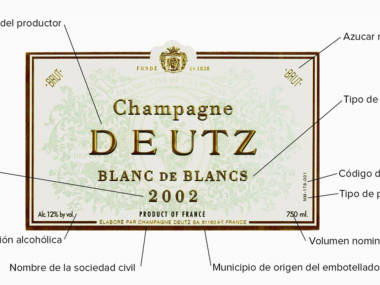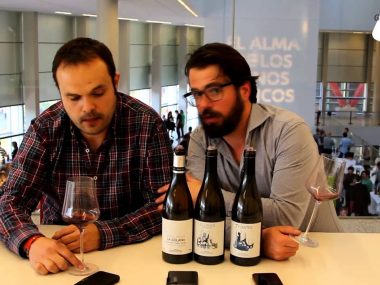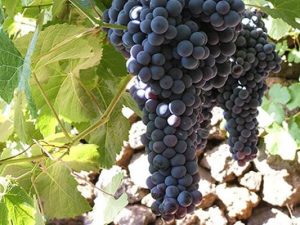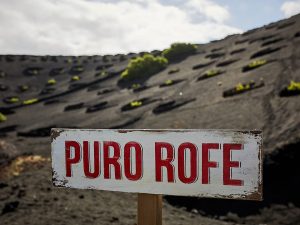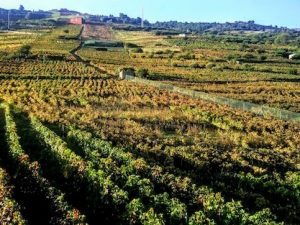On our journey to find out all about txakolí, we have interviewed one of the people who knows the most about it, Asier Dañobeitia, a member of the tasting panel of the DO Bizkaiko Txakolina. In this interview, he explains where the word ‘txakoli’ comes from, what are the origins of this drink so deeply rooted in its territory, what makes it so special and what we can expect from it in the future.
What does Txakoliña mean?
It is a contraction that we have in Euskadi, Txakoliña is “etxean eginda”, homemade, just for home, because txakoli was usually a product that was only drunk at home, it was made at home as another food. It was a subsistence economy. But the first evidence of our txakoli, both in Guipúzcoa, Vizcaya and Álava, dates back to 1600 and at the end of the 19th century, at the beginning of the 20th century, before phylloxera, we had 2,800 hectares of vineyards. Then phylloxera arrived, everything was destroyed and now we have 400 hectares of txakoli in Bizkaia, another 400 in Guipúzcoa and not even 100 in Álava. But the word txacoliña means etxean eginda, which is then contracted and is etxean eginda, because contractions in our wonderful language are very common. Etxean eginda.
What do you highlight about txakoli?
Without a doubt, the acidity, which gives it an eternal youth. It is eternal youth.
Can it be said that Txakoli is one of the best wines in the world?
It can be considered to be one of the great wines of the world, in fact, it was awarded the Zura prize as the best white wine in the world last year. In other words, there is the evidence.
What can someone tasting txakoli for the first time expect from it?
Well, you can expect those absolute rotation wines, fresh, fragrant, to drink as an aperitif. If you want to go for a much more gastronomic profile, you can find wines that are much longer and more gastronomic. And if you want to go to really extraordinary things, you can find those wines of wine, of flowers? You can have it all within our appellation.
What do you love most about Txakoli?
What I love most, without a doubt, is the uniqueness of our wine. Singularity. Txakoli, that’s us, that’s our character, that’s who we are. That’s right, txakoli, that’s us. We are Vizcaya, Guipúzcoa, Álava, the Basques. What the wind, the sea, the mountains are. That’s what we are.
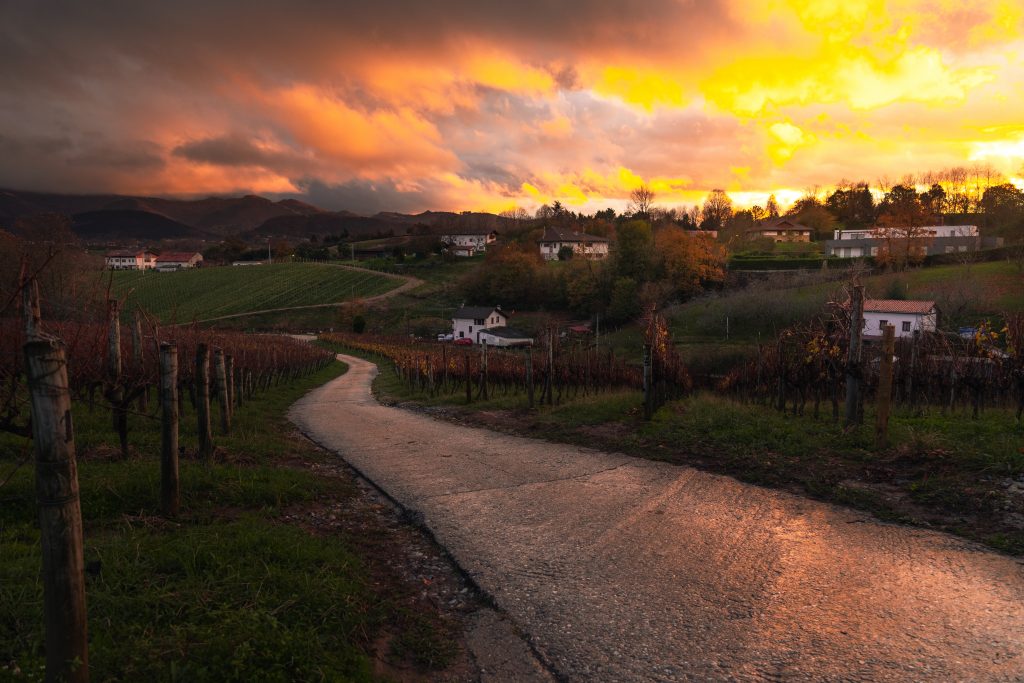
What are your favourite txakolis?
I really like Txomin Etxaniz because he has put us on the map. Thanks to Txomin Etxaniz, in many ways, txakoli is drunk. I really like a txakoli from Arabako Txakolina, UNO, because of the uniqueness of the way it is made, the way it is made, the way the vineyard is used. Then I really like Bizkaiko Txakolina, because there are some 36 wineries in this denomination of origin, some of which are extraordinary. We have Gorka Izaguirre the winery, which is doing some really extraordinary things. We have Bizkai Barne, with Alfredo Egia and Imanol Garay, who are doing brutal, incredible things, in all formats, from rotation to everything. Finally, we have Doniene Gorrondona, right in Bakio, with a salinity, a complexity, elaborations and spontaneous fermentations.
How much has txakoli changed throughout its history?
It has changed a lot. When I was a child -I am 50 years old now-, I lived in a farmhouse where txakoli was made as a way of eating. My parents made txakoli, my grandparents made txakoli. We enjoyed txakoli. There were no ways of making it and we drank what we drank. But right now we are in an impressive process of revolution. We are getting very high scores in all the most important guides in the world. And that acidity that makes our wines young is making our wines transcend the whole world. Everybody wants our wines. Everyone wants our txakoli.
How important is terroir in txakoli?
It is fundamental. It is our essence. It is who we are. It is that vineyard with a 25-degree slope to the south, where Gorka Izaguirre is made. Those vineyards in Zalla, where Alfredo Egia is made. Those extraordinary wines, in those two hectares. Those vineyards where Oxer produces in Gernika, in Kortezubi. Those wines that Itziar makes, the wines of Doniene Gorrondona, with the orientation of the slopes at 50 200 metres, right in Bakio. It is fundamental. Without that, there would be no txakoli.
Can we gasify txakoli?
Well, gasify. If you go to Guetaria and you are sunbathing in Guetaria with your family and having a Gilda and you order a slightly classified txakoli, a touch of gas. It goes down well, you enjoy it. You enjoy it. What else? It is a pleasure. Wine is pleasure. We have to enjoy the pleasure of drinking wine.
Can you imagine old vintage txakolis in the future?
Old vintage txakoli. We have a city that makes wines that are eternally young. Why not? The thing is that our history is very short. For example, the Bizkaika Txacolina appellation appeared in 1994, but I am sure that we will have very old vintages of txakoli in the future. That acidity keeps our wine young.
Is it possible to think of natural txakolis?
Of course it is, in the end a natural wine is a wine without intervention. In fact, we have one in the Bizkaika Txacolina designation of origin, as far as I know, the IRI, and I’m sure there will be more.
What challenges await you in the future?
The challenges we have to face are to transcend, especially at a global level, to really believe that we, in Bizkaika Txacolina, Arabako Txacolina and Getariako Txacolina, make the best wines in the world. Believe it, because once you believe it, we are from Bilbao. I am from Bilbao. Once you believe it, it’s done.

